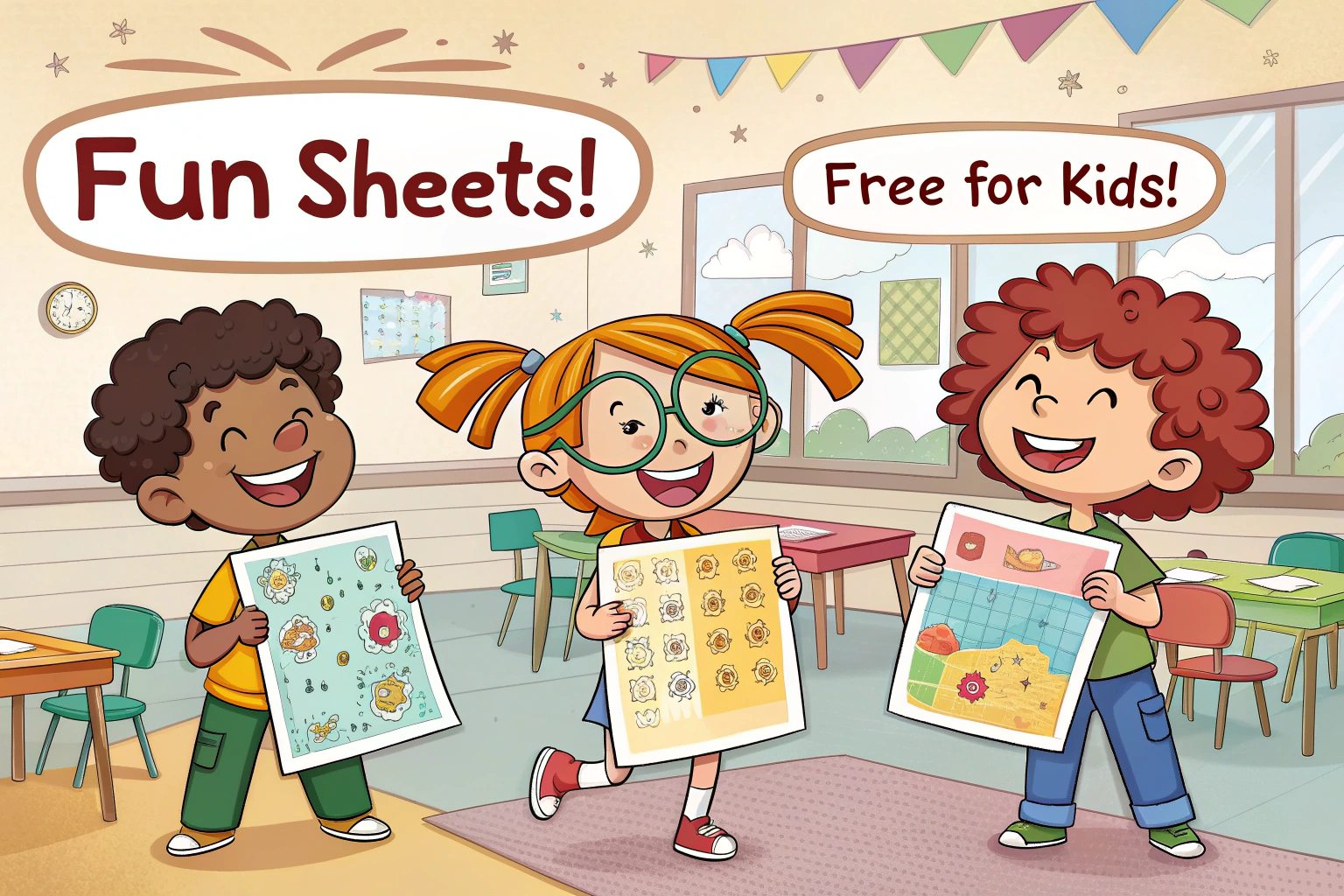Introducing Color Learning Sheets for Preschool Children: A Fun and Educational Journey
Colors are among the first concepts children begin to recognize and learn about as they explore the world around them. Understanding colors not only helps children describe and categorize what they see but also enhances their cognitive development and creativity. Introducing sheets specifically designed to help preschool children learn colors can be a fantastic way to make this learning process engaging and effective. In this blog post, we’ll explore the importance of color learning, the benefits of using learning sheets, and how to effectively incorporate them into a preschooler’s daily routine.
The Importance of Learning Colors in Early Childhood
Cognitive Development
Learning colors is a fundamental part of a child’s cognitive development. Recognizing and naming colors helps children develop their memory and recall abilities. It also lays the groundwork for learning more complex concepts in the future, such as shapes, numbers, and letters.
Language Skills
When children learn the names of different colors, they expand their vocabulary and improve their language skills. Describing objects by their colors also encourages children to communicate more effectively and precisely.
Creative Expression
Understanding and using colors is crucial for creative expression. Whether it’s drawing, painting, or choosing clothes, colors play a significant role in how children express themselves artistically.
Emotional Development
Colors can have a profound effect on emotions. Learning about different colors and their associations can help children express their feelings and understand the feelings of others. For example, warm colors like red and yellow are often associated with excitement and happiness, while cool colors like blue and green can evoke calmness.
Benefits of Using Learning Sheets for Color Education
Structured Learning
Color learning sheets provide a structured way for children to explore and understand colors. They offer clear, focused activities that guide children through the learning process step-by-step.
Engagement and Interaction
Well-designed learning sheets are interactive and engaging, making learning fun. They can include activities like coloring, matching, and identifying colors in different contexts, which keeps children interested and motivated.
Versatility
Color learning sheets can be used in various settings, from home to preschool classrooms. They are versatile tools that can be easily integrated into different educational activities and routines.
Reinforcement of Concepts
These sheets allow for repeated practice and reinforcement of color concepts. Children can go over the same sheets multiple times, helping to solidify their understanding and recall of colors.
Accessibility
Learning sheets are accessible to all children, including those with different learning styles and abilities. They can be easily adapted to suit individual needs, making them an inclusive educational tool.
How to Use Color Learning Sheets Effectively
Start with Basic Colors
Begin with primary colors (red, blue, yellow) and gradually introduce secondary colors (green, orange, purple). This step-by-step approach helps children build a solid foundation before moving on to more complex color concepts.
Incorporate Real-Life Objects
Use learning sheets that include pictures of real-life objects colored in primary and secondary colors. This helps children make connections between the colors they see on the sheets and the colors in their environment.
Use Thematic Sheets
Create or find learning sheets with themes that interest the child, such as animals, seasons, or favorite characters. Themed sheets can make learning more relatable and enjoyable for children.
Interactive Activities
Include a variety of activities such as coloring sections, matching games, and simple puzzles. Interactive activities enhance engagement and make learning more dynamic.
Encourage Creativity
While structured learning is important, it’s also beneficial to encourage creativity. Provide blank sheets where children can draw and color freely, allowing them to experiment with different color combinations and express their creativity.
Consistent Practice
Integrate color learning sheets into the daily or weekly routine. Consistent practice is key to reinforcing the concepts and ensuring long-term retention.
Color learning sheets are a fantastic resource for helping preschool children explore and understand the vibrant world of colors. They offer structured, engaging, and versatile activities that cater to various learning styles and abilities. By incorporating these sheets into a child’s daily routine, parents and educators can provide a fun and educational experience that fosters cognitive development, language skills, creativity, and emotional understanding.
Whether you choose to create your own sheets or use pre-made ones, the key is to make the learning process enjoyable and consistent. With the right approach and resources, children can develop a strong foundation in color recognition and appreciation, setting the stage for a lifelong love of learning and creativity.













You May Also Like:
Free Colorful Worksheets for Early Learners
Free ABC Handwriting Printables: Learning Made Fun and Easy!
Cute kawaii Sweets Candy Ice cream Cup Cakes Free Coloring pages for kids
Free coloring pages for adults Spring flowers and butterflies
Free Coloring Pages for Kids About Space and Astronauts
Free Coloring ages Of Easter Bunnies and Spring Holidays For Kids
FREE PRINTABLES FOR KIDS UNDER SEA COLORING PAGES
Free Coloring Pages For Kids Based On Super Mario Character | Free Printables For Kids
Free Coloring Pages For kids| Animals Coloring Pages
Free Coloring Pages Of Cute Animals Simple For Kids
Cartoon Baby Girl Coloring Pages For Kids




